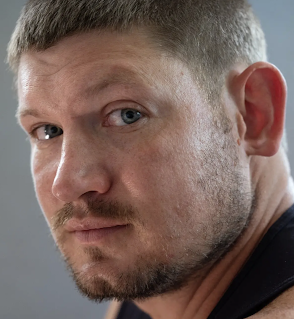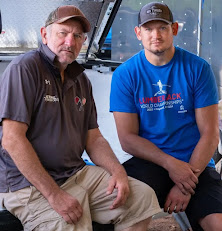 |
| Jason Lentz (Photo by Natalie Ivis, The New York Times) |
Growing up in Webster County, West Virginia, Lentz saw how lumberjacking hurt his family: "Jason hated that lumberjacking took his dad [Mel] away for as many as 11 months a year, barnstorming the country and world in search of competitions and their measly winner’s checks. He could make $500 or $1,000 at a show, but the winnings didn’t amount to much when set beside the cost of equipment and travel," Forgrave writes. "For a time, Mel worked a lumberjack show at Sea World Ohio, while Jason, his mother and his little sister scraped by in West Virginia. Jason blamed the sport for his growing up poor — poor even by the standards of one of the poorest counties in one of America’s poorest states." Jason told the Times, "I didn't want to be anything like him."
Right out of high school Jason dissed lumberjacking and focused on basketball, Forgrave reports, but when his post-college overseas basketball opportunity vanished, Jason was poor and lost. "Then his father put him in touch with a friend who had a job for Jason doing lumberjack exhibitions at Chimelong Paradise, an amusement park in Guangzhou, China," Forgrave notes. "Reluctant to follow in his dad’s steps but out of options, he flew to the other side of the world. There, out from under Mel’s shadow, Jason Lentz was free to find his own path. It led him right back to his father."
In China and then around the world, Lentz found his place as powerhouse lumberjack, "That brute strength is the advantage that Lentz, who is roughly the size of an NFL tight end, holds over virtually all his opponents in the Stihl Timbersports Series, which are the biggest-money events in the sport," Forgave reports. Stihl series calls lumberjacking "the original extreme sport." And for those who may think it's all about brute strength, Forgrave explains: "Lentz and other lumberjacks often compare their sport to golf: Power comes from hip torque instead of arm strength; precision comes from producing a repeatable swing. As in golf, the difference between really good and a champion often depends on mental strength: being able to forget one bad swing and move on to the next."
 |
| Mel and Jason Lentz (Natalie Ivis, NYT) |
Jason Lentz, 37, told Forgrave, “It’s the maturity thing. It’s like golf. My next 10 years, 13 years — those are going to be my prime.”
No comments:
Post a Comment